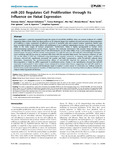Mostrar o rexistro simple do ítem
miR-203 regulates cell proliferation through Its influence on Hakai expression
| dc.contributor.author | Abella Cajigal, Vanessa | |
| dc.contributor.author | Valladares-Ayerbes, Manuel | |
| dc.contributor.author | Rodríguez, Teresa | |
| dc.contributor.author | Haz, Mar | |
| dc.contributor.author | Blanco, Moisés | |
| dc.contributor.author | Tarrío, Nuria | |
| dc.contributor.author | Iglesias, Pilar | |
| dc.contributor.author | Antón-Aparicio, Luis M. | |
| dc.contributor.author | Figueroa, Angélica | |
| dc.date.accessioned | 2017-06-19T12:18:10Z | |
| dc.date.available | 2017-06-19T12:18:10Z | |
| dc.date.issued | 2012-12-20 | |
| dc.identifier.citation | Abella V, Valladares M, Rodríguez T, et al. miR-203 regulates cell proliferation through Its influence on Hakai expression. PLoS ONE [Internet]. 2012 Dec 20 [acceso 2017 Jun 19];7(12):e52568. Disponible en: http://journals.plos.org/plosone/article?id=10.1371/journal.pone.0052568 | es_ES |
| dc.identifier.issn | 1932-6203 | |
| dc.identifier.uri | http://hdl.handle.net/2183/19187 | |
| dc.description.abstract | Gene expression is potently regulated through the action of microRNAs (miRNAs). Here, we present evidence of a miRNA regulating Hakai protein. Hakai was discovered as an E3 ubiquitin-ligase that mediates the posttranslational downregulation of E-cadherin, a major component of adherens junctions in epithelial cells and a potent tumour suppressor. Recent data have provided evidence that Hakai affects cell proliferation in an E-cadherin-independent manner, thus revealing a role for Hakai in the early stages of tumour progression. Furthermore, Hakai is highly up-regulated in human colon adenocarcinomas compared to normal tissues. However, the molecular mechanisms that regulate Hakai abundance are unknown. We identified two putative sites of miR-203 interaction on the Hakai mRNA, in its 3′-untranslated region (UTR). In several human carcinoma cell lines tested, overexpression of a miR-203 precursor (Pre-miR-203) reduced Hakai abundance, while inhibiting miR-203 by using an antisense RNA (Anti-miR-203) elevated Hakai levels. The repressive influence of miR-203 on the Hakai 3′-UTR was confirmed using heterologous reporter constructs. In keeping with Hakai's proliferative influence, Anti-miR-203 significantly increased cell number and BrdU incorporation, while Pre-miR-203 reduced these parameters. Importantly, the growth-promoting effects of anti-miR-203 required the presence of Hakai, because downregulation of Hakai by siRNA suppressed its proliferative action. Finally, in situ hybridization showed that miR-203 expression is attenuated in colon tumour tissues compared to normal colon tissues, suggesting that miR-203 could be a potential new prognostic marker and therapeutic target to explore in colon cancer. In conclusion, our findings reveal, for the first time, a post-transcriptional regulator of Hakai expression. Furthermore, by lowering Hakai abundance, miR-203 also reduces Hakai-regulated-cell division. | |
| dc.description.sponsorship | Xunta de Galicia; 10CSA916023PR | es_ES |
| dc.description.sponsorship | Instituto de Salud Carlos III; CA09/00116 | es_ES |
| dc.description.sponsorship | Xunta de Galicia; IPP.08-07 | es_ES |
| dc.language.iso | eng | es_ES |
| dc.publisher | PLoS | es_ES |
| dc.relation.uri | http://dx.doi.org/10.1371/journal.pone.0052568 | es_ES |
| dc.rights | Atribución 3.0 España | es_ES |
| dc.rights.uri | http://creativecommons.org/licenses/by/3.0/es/ | * |
| dc.title | miR-203 regulates cell proliferation through Its influence on Hakai expression | es_ES |
| dc.type | info:eu-repo/semantics/article | es_ES |
| dc.rights.access | info:eu-repo/semantics/openAccess | es_ES |
| UDC.journalTitle | PLoS One | es_ES |
| UDC.volume | 7 | es_ES |
| UDC.issue | 12 | es_ES |
| UDC.startPage | e52568 | es_ES |
Ficheiros no ítem
Este ítem aparece na(s) seguinte(s) colección(s)
-
INIBIC-OCT - Artigos [21]






